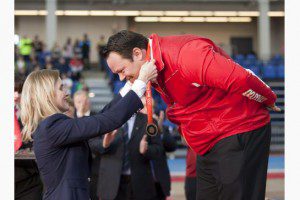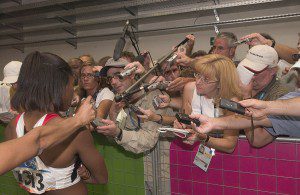
I read the newspapers over the weekend. I expected to see news about a trade involving the Maple Leafs. And there it was on the front page of Monday’s Toronto Star sports section. Defenceman Cody Franson is gone. So is perhaps the hardest working forward on the team, Mike Santorelli. Then, Tuesday online, I caught a bit of the reporter scrum involving Toronto’s newest acquisition in the deal, 36-year-old Nashville Predator Olli Jokinen responding to the question: “Are you surprised?”
“Yeah, absolutely,” he told the Star. “Why wouldn’t I be?”
Then, the Finnish-born veteran stuck his hands in his pockets and tried to rationalize his position, going from the NHL’s top team to the 26th place Leafs. He really dug deep for some cliché responses: that he would take it day by day, that he still loves and respects the game, and that the bottom line is he has to do what he’s told to do. Oh yes, and by the way, he’ll still be getting his $2.5 million salary.
I’m sure you’ve heard this before, but I can’t resist pointing out how ridiculous it is to feel sorry for any of North America’s professional athletes, who are coddled, spoiled, over-protected and over-paid because the league, the players’ associations and we (the fans) tolerate such extravagance.

Which athletes do I respect, you may ask? Well, as a matter of fact, one of them appeared in the same edition of the Star (the one with the photo of the Leafs’ bench during their loss to Montreal on Saturday night). There, on Page 4, nearly lost in the anonymity of a NASCAR story and the latest golf results form Pebble Beach, was a photograph of Olympian Hayley Wickenheiser placing a bronze medal around the neck of Dylan Armstrong. There, in a Kamloops, B.C., arena, Armstrong’s years of patience were being rewarded. After much investigation and obfuscation, the International and Canadian and Olympic committees finally awarded the Beijing Summer Games shot put bronze medal (stripped from Belarus’s Andrei Mikhnevich, for using banned steroids) to fourth-place Armstrong.
“Thank you to the (Olympic Committee) for getting this medal back to Canada where it really belongs,” Armstrong told reporters on Sunday.

Never mind the Olympic Committee. Armstrong’s is a story of dedication to the sport of shot put from the time he was nine years old. His is a story of listening to his coaches, practising after everybody else has gone home, borrowing money from friends and family to travel to events so that he could improve, and competing on behalf of his country.
“It just shows, if you’re dedicated and you work hard, you can do it clean,” Armstrong said after the ceremony. “I’m a prime example of that.”

By coincidence I met another prime example of such dedication. I recently invited a track and field Olympian to speak to a group of journalism students where I teach. By way of introduction, I explained she had trained for the better part of a decade in obscurity before winning her first major international event at Paris in 2003. I also said, like so many amateurs who compete for Canada, that she’d too often received scorn for not “owning the podium.” But ultimately she did win. In over 13 years of world calibre competition she was a two-time Olympian, two times a world champion and 10 times a national champion in the women’s 100-metre hurdles.
“In my books,” I said told my students, “Perdita Felicien is a true champion.”
Originally from Pickering, Ont., Felicien’s early victories at city and provincial levels were often overlooked or missed. But when she took gold at the International Amateur Athletics Federation championship in France in 2003, upsetting all the expected winners, Felicien was suddenly in the limelight. Then, in 2004, at the Olympics in Greece, where she was expected to take the gold, and where she accidentally stumbled over a hurdle, her world came crashing down. Recognizing her embarrassment, Olympic officials told her she didn’t have to face the media’s questions.

“No,” she said. “If I can win and hold the Canadian flag … there has to be an honesty (if you lose). I answered every single reporter’s question.”
And when my students probed her further during her visit to the college, she didn’t back down. She admitted when she first started in track that she’d hated the hurdles; she was afraid of them. But when she recognized that hurdles fall all the time, getting over them became easier. Ultimately, she told our student reporters she’d learned about the responsibility that comes with winning and losing. She’d learned the key is realizing the privilege one has to compete internationally and become a model influencing others. Of her fall in Athens, she said finally:
“Don’t let the moment define you. You define it.”
A single amateur athlete has a much better sense of competition and reality, I think, than a stretch limousine full of professionals any day.